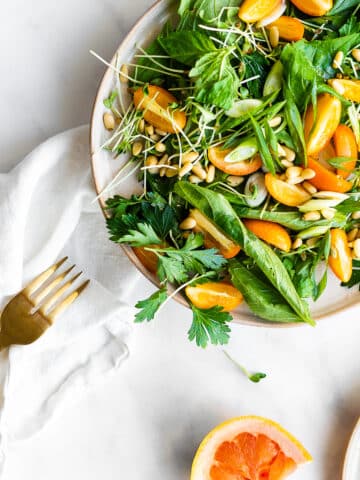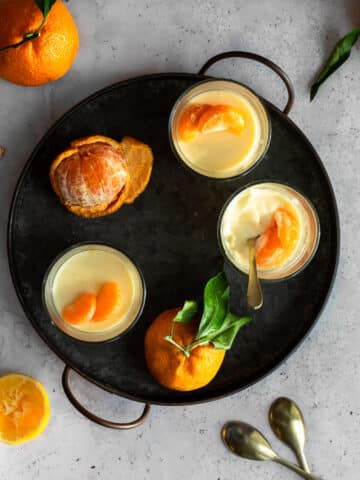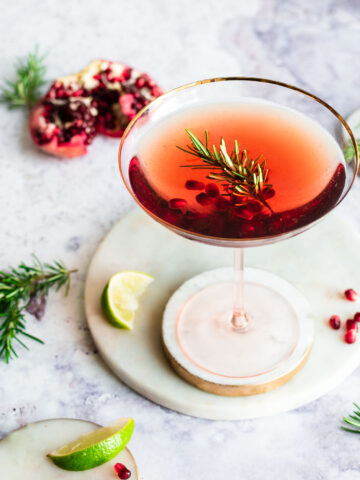Preserved lemons bring bright notes of citrus, vibrant saltiness, and muted, complex tartness to your cooking. They gain their characteristic flavor through long, slow fermentation.
This traditional process that breaks down the lemon rind, removes its bitterness, and gives you a marvelously complex, bright flavor that pairs beautifully with roasted chicken, grilled fish, and braised vegetables.

Jump to
What are preserved lemons?
Preserved lemons are lemons that have been salted and packed into jars where they ferment for several weeks to several months. Fermentation naturally preserves the lemons as it does for other fermented fruits, and the process results in a delicious condiment that's bursting with the beneficial bacteria that are so good for your gut.
You'll find them in the culinary traditions of North Africa, and they feature prominently in Moroccan cooking where they're often paired with chicken or fish or added to slowly cooked deeply flavorful tagines.
What do they taste like?
The flesh of preserved lemons is bright, salty, and citrusy, and you can use it to make sauces or in vinaigrettes. While the flesh is nice, the rind is particularly valued, and it loses its bitterness during fermentation leaving a pleasantly tart, salty, floral flavor that is well-suited to a variety of dishes.
How long do they last?
Fermentation, or the process of preserving lemons the traditional Moroccan way, takes about a month or two, depending on the volume you plan to make. More lemons require more fermentation time. Lemons are ready once their rind becomes pliable and loses its bitterness.
Once they're properly fermented, they'll last six months to a year. You can store them in the refrigerator; however, they can also be stored at room temperature because the salty, acidic brine created during fermentation acts as a preservative, just as vinegar would.
Tips for Making Preserved Lemons
To make Moroccan preserved lemons, you'll need to first select your lemons. Thin-skinned lemons like Meyer lemons work particularly well since they require less time for the rind to soften and release its bitterness, so they are done and ready to use faster than if you use thick-skinned lemons.
- Use thin-skinned lemons such as Meyer lemons. They'll lose their bitterness and ferment more quickly than thick-skinned lemons.
- Cut the very tips off the lemons, just the nubs at either end, as they can retain bitterness long after the rest of the lemon is ready.
- You need to cut them a special way. While you can quarter or slice the lemons, to make preserved lemons you need to slice them as though you'll quarter them, but leaving them connected. This allows you to sprinkle the cavity with salt.
- Use an airtight container to help prevent mold formation. A weight to keep the lemons submerged and a fermentation seal will help even more.
How to Use Them
Fermented lemons have a pleasant, complex citrus flavor that pairs beautifully with savory dishes. They marry particularly well with chicken and fish dishes, and you can also use them to make condiments and sauces.
In most culinary applications, you'll discard the preserved lemon's flesh, and reserve its rind; however, both parts are edible.
Savory-Roasted Chicken with Lemon blends preserved lemons and fresh herbs with chicken and root vegetables.
Preserved Lemon Allioli is a bright, citrusy condiment made with lemon, olive oil, and garlic.
Preserved Lemon and Parsley Tapenade is an excellent condiment to serve on top of grilled fish.






Fawn Rosenberg says
Do you burp the jar daily until fully fermented? Thank you!
Jenny McGruther says
You can burp the jar daily if you're concerned. The best approach would be to use a fermentation seal that allows CO2 to escape.
Brushjl says
My second time trying preserved lemon and it was a fail this time too. I suspect the seals on my Mason jars are off.
Brushjl says
I guess I used a jar with a bad seal, they went moldy after a week. But I could use the pulp, somehow that didn't go bad.
Catherine says
These are dead easy. I take it one step further (after too many times forgetting them on on a shelf). After about 3 weeks sitting in their juices, I remove the innards, rinse them and pulverize them into a paste. I add just a little lemon juice and keep in a jar in fridge to add to marinades, sauces, dressings. You name it. Extra jars freeze well too.
Jenny McGruther says
That's brilliant advice, Catherine! I bet that paste is super delicious.
Noel says
Just made 4 jars of this ...using recipes that have not failed me in the past.
My only issue with using whole lemons/limes is that 1 jar went off...so I have decided to cut them in bite sizes this time.
Using a lot of other spices to boot...
Ashley says
I have been using this recipe for about 5 years now. Its my favorite and I love the Meyer lemons in the winter to add some cheer to my Midwest life. My last lemons have lasted over 2 yrs. I keep them in the back of the fridge after fermentation time is over. Delightful!!
Amanda R. says
Recently there was a whole Reddit thread on what cut/shape to make the lemons, and someone determined the idea of keeping them partially quartered was just repeating the same recipe all over the internet. (Cool rabbit hole on transmission of data!) Anywho, I'm doing quartered quarters now because that's convenient for my recipes. Bonus of fitting an extra half lemon in there, but also I am keeping the glass weight in there. Love the spread of natural and fermented / preserved-type recipes!
Catherine says
I take it one step further. I do all of the prep as in this recipe, but at about 3 weeks, take them out, remove innards and rinse, and then using an immersion blender blend the heck out of them with a little lemon juice(just to bring back some brightness). I jar the paste and use it on just about everything. Keeps in the fridge, well I guess a year. I go through it pretty quickly. I use it in tuna salad, marinades, dressings on pasta…get your imagination rolling.
Eileen says
So this looks super easy, and I like that it's just lemons and salt. I've been wanting to make a tagine with it, but I'm wondering how long preserved lemons keep?
Julie says
Loved this recipe, and did it with limes instead of lemons. Seemed to work fine.
Joy Beach Thomas says
This is the perfect recipe for fermented lemons. I made sure they were submerged with a water filled baggie. 30 days was correct.
4waystoyummy says
Here’s my preserved lemons! I wish I could include a photo!
Amber says
These are so good with roasted chicken!
Heide says
Your recipe came just in time as I bought a large bag of organic lemons to make lemon extract with...and still have lots of lemons. I make kombucha regularly and look forward to this new lemon fizzy concoction! I was wondering does sour cream have whey too? Can that be used? Also I picked a lot of blackberries and froze them last summer...time to do somethign with them? Can they be added to these drinks or preserved lemons? Hmmm?
Gina says
This is amazing. Thanks for the recipe though it sounds lovely
Sherryn Frigon says
Hi Jenny,
I love your site and recipes. I made these lemons several years ago, when I first got your recipe. I love to cook with them. They make the best roast chicken ever and I am not a fan of chicken. I want to make them again but have family members with sea salt allergies. Can you use regular canning and pickling salt for these? Thanks for all of your wonderful recipes.
Sherry
Michele says
I love lemon on my salmon, steamed broccoli, roast chicken, and to tone done anything too salty tasting on my plate. I just bought my lemons today and will be doing this. And after those 3 or 4 weeks, they'll be making an appearance in a moroccan tajine recipe.
Steve Heikkila says
Absolutely love this recipe, Jenny. I don't think I can live without a jar of preserved lemons around anymore. They're so bright and intense. Thanks for this!
ida says
My husband made these years ago and used them as a basis for chutney. Heavenly.
Christina B. says
I finally opened my jar of lemons that I started last December. I made roast chicken with one sliced in half amongst the juices. It was heavenly! Next time I will ferment thesm in my fido jars since I did get a mold cap that was pretty funky. I tossed the first two layers of lemons. I used a 2 gallon jar and forgot about it for far too long. Thanks for the idea!
Lorraine says
Funny, I am reading this as I sip a drink I concocted with a little lemon preserve. I made a jar more than a month ago and am looking for ways to use them. It is a hot day here which means I need salt so I decided to add a little lemon preserve to my coconut water, ginger tea, fizzy water blend. It is really refreshing!
Ray says
Awesome, unique ferment. Thanks for the tutorial! Can't wait to try these!
Eliza says
Oh how absolutely divine! It is certainly the right season for lemons, we should all make these and enjoy the increased digestive fire and boosted vitamin content 🙂
Krissee @ Granola Funk Mama says
So glad you are covering this today. I've made them years ago and loved them as a flavor enhancer for just about everything. Thanks for reminding me. IT's about time to try again.
healthy energy drinks says
i recently tried this with meyer lemons and the flavor just burst in your mouth.
Liberty Cowden says
These sound wonderful!